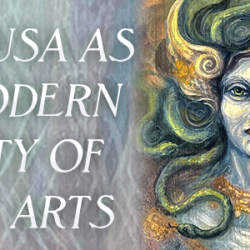He also used biblical examples of civil disobedience to make his point. Shadrach, Meshach, and Abednego took a stand for God's law over the law of King Nebuchadnezzar. Paul was willing to "bear in my body the marks of the Lord Jesus." And, of course, Jesus Christ was an "extremist for love, truth, and goodness" who "rose above his environment."
In the end, Birmingham's destiny was connected to the destiny of the entire nation—a nation that possessed what King called a "sacred heritage," influenced by the "eternal will of God." By fighting against segregation, King reminded the Birmingham clergy that he was standing up for "what is best in the American dream and for the most sacred values in our Judeo-Christian heritage, thereby bringing our nation back to those great wells of democracy which were dug deep by the founding fathers in their formulation of the Constitution and the Declaration of Independence." (italics mine)
It sounds to me that King wanted America to be a Christian nation. The Civil Rights movement, as he understood it, was in essence an attempt to construct a new kind of Christian nation—a beloved community of love, harmony, and equality.





